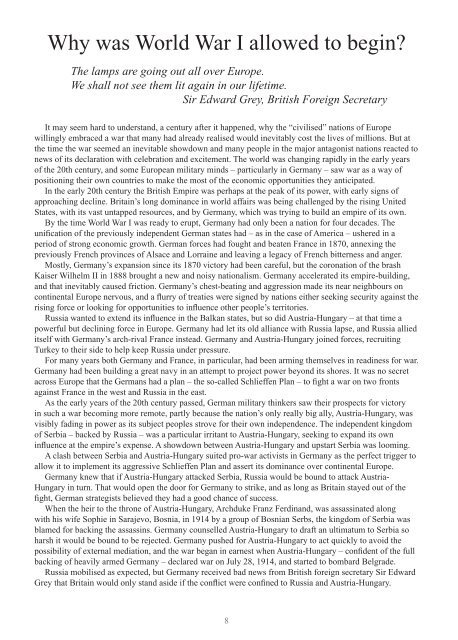You also want an ePaper? Increase the reach of your titles
YUMPU automatically turns print PDFs into web optimized ePapers that Google loves.
Why was World <strong>War</strong> I allowed to beg<strong>in</strong>?<br />
The lamps are go<strong>in</strong>g out all over Europe.<br />
We shall not see <strong>the</strong>m lit aga<strong>in</strong> <strong>in</strong> our lifetime.<br />
Sir Edward Grey, British Foreign Secretary<br />
It may seem hard to understand, a century after it happened, why <strong>the</strong> “civilised” nations of Europe<br />
will<strong>in</strong>gly embraced a war that many had already realised would <strong>in</strong>evitably cost <strong>the</strong> lives of millions. But at<br />
<strong>the</strong> time <strong>the</strong> war seemed an <strong>in</strong>evitable showdown and many people <strong>in</strong> <strong>the</strong> major antagonist nations reacted to<br />
news of its declaration with celebration and excitement. The world was chang<strong>in</strong>g rapidly <strong>in</strong> <strong>the</strong> early years<br />
of <strong>the</strong> 20th century, and some European military m<strong>in</strong>ds – particularly <strong>in</strong> Germany – saw war as a way of<br />
position<strong>in</strong>g <strong>the</strong>ir own countries to make <strong>the</strong> most of <strong>the</strong> economic opportunities <strong>the</strong>y anticipated.<br />
In <strong>the</strong> early 20th century <strong>the</strong> British Empire was perhaps at <strong>the</strong> peak of its power, with early signs of<br />
approach<strong>in</strong>g decl<strong>in</strong>e. Brita<strong>in</strong>’s long dom<strong>in</strong>ance <strong>in</strong> world affairs was be<strong>in</strong>g challenged by <strong>the</strong> ris<strong>in</strong>g United<br />
States, with its vast untapped resources, and by Germany, which was try<strong>in</strong>g to build an empire of its own.<br />
By <strong>the</strong> time World <strong>War</strong> I was ready to erupt, Germany had only been a nation for four decades. The<br />
unification of <strong>the</strong> previously <strong>in</strong>dependent German states had – as <strong>in</strong> <strong>the</strong> case of America – ushered <strong>in</strong> a<br />
period of strong economic growth. German forces had fought and beaten France <strong>in</strong> 1870, annex<strong>in</strong>g <strong>the</strong><br />
previously French prov<strong>in</strong>ces of Alsace and Lorra<strong>in</strong>e and leav<strong>in</strong>g a legacy of French bitterness and anger.<br />
Mostly, Germany’s expansion s<strong>in</strong>ce its 1870 victory had been careful, but <strong>the</strong> coronation of <strong>the</strong> brash<br />
Kaiser Wilhelm II <strong>in</strong> 1888 brought a new and noisy nationalism. Germany accelerated its empire-build<strong>in</strong>g,<br />
and that <strong>in</strong>evitably caused friction. Germany’s chest-beat<strong>in</strong>g and aggression made its near neighbours on<br />
cont<strong>in</strong>ental Europe nervous, and a flurry of treaties were signed by nations ei<strong>the</strong>r seek<strong>in</strong>g security aga<strong>in</strong>st <strong>the</strong><br />
ris<strong>in</strong>g force or look<strong>in</strong>g for opportunities to <strong>in</strong>fluence o<strong>the</strong>r people’s territories.<br />
Russia wanted to extend its <strong>in</strong>fluence <strong>in</strong> <strong>the</strong> Balkan states, but so did Austria-Hungary – at that time a<br />
powerful but decl<strong>in</strong><strong>in</strong>g force <strong>in</strong> Europe. Germany had let its old alliance with Russia lapse, and Russia allied<br />
itself with Germany’s arch-rival France <strong>in</strong>stead. Germany and Austria-Hungary jo<strong>in</strong>ed forces, recruit<strong>in</strong>g<br />
Turkey to <strong>the</strong>ir side to help keep Russia under pressure.<br />
For many years both Germany and France, <strong>in</strong> particular, had been arm<strong>in</strong>g <strong>the</strong>mselves <strong>in</strong> read<strong>in</strong>ess for war.<br />
Germany had been build<strong>in</strong>g a great navy <strong>in</strong> an attempt to project power beyond its shores. It was no secret<br />
across Europe that <strong>the</strong> Germans had a plan – <strong>the</strong> so-called Schlieffen Plan – to fight a war on two fronts<br />
aga<strong>in</strong>st France <strong>in</strong> <strong>the</strong> west and Russia <strong>in</strong> <strong>the</strong> east.<br />
As <strong>the</strong> early years of <strong>the</strong> 20th century passed, German military th<strong>in</strong>kers saw <strong>the</strong>ir prospects for victory<br />
<strong>in</strong> such a war becom<strong>in</strong>g more remote, partly because <strong>the</strong> nation’s only really big ally, Austria-Hungary, was<br />
visibly fad<strong>in</strong>g <strong>in</strong> power as its subject peoples strove for <strong>the</strong>ir own <strong>in</strong>dependence. The <strong>in</strong>dependent k<strong>in</strong>gdom<br />
of Serbia – backed by Russia – was a particular irritant to Austria-Hungary, seek<strong>in</strong>g to expand its own<br />
<strong>in</strong>fluence at <strong>the</strong> empire’s expense. A showdown between Austria-Hungary and upstart Serbia was loom<strong>in</strong>g.<br />
A clash between Serbia and Austria-Hungary suited pro-war activists <strong>in</strong> Germany as <strong>the</strong> perfect trigger to<br />
allow it to implement its aggressive Schlieffen Plan and assert its dom<strong>in</strong>ance over cont<strong>in</strong>ental Europe.<br />
Germany knew that if Austria-Hungary attacked Serbia, Russia would be bound to attack Austria-<br />
Hungary <strong>in</strong> turn. That would open <strong>the</strong> door for Germany to strike, and as long as Brita<strong>in</strong> stayed out of <strong>the</strong><br />
fight, German strategists believed <strong>the</strong>y had a good chance of success.<br />
When <strong>the</strong> heir to <strong>the</strong> throne of Austria-Hungary, Archduke Franz Ferd<strong>in</strong>and, was assass<strong>in</strong>ated along<br />
with his wife Sophie <strong>in</strong> Sarajevo, Bosnia, <strong>in</strong> 1914 by a group of Bosnian Serbs, <strong>the</strong> k<strong>in</strong>gdom of Serbia was<br />
blamed for back<strong>in</strong>g <strong>the</strong> assass<strong>in</strong>s. Germany counselled Austria-Hungary to draft an ultimatum to Serbia so<br />
harsh it would be bound to be rejected. Germany pushed for Austria-Hungary to act quickly to avoid <strong>the</strong><br />
possibility of external mediation, and <strong>the</strong> war began <strong>in</strong> earnest when Austria-Hungary – confident of <strong>the</strong> full<br />
back<strong>in</strong>g of heavily armed Germany – declared war on July 28, 1914, and started to bombard Belgrade.<br />
Russia mobilised as expected, but Germany received bad news <strong>from</strong> British foreign secretary Sir Edward<br />
Grey that Brita<strong>in</strong> would only stand aside if <strong>the</strong> conflict were conf<strong>in</strong>ed to Russia and Austria-Hungary.<br />
8













